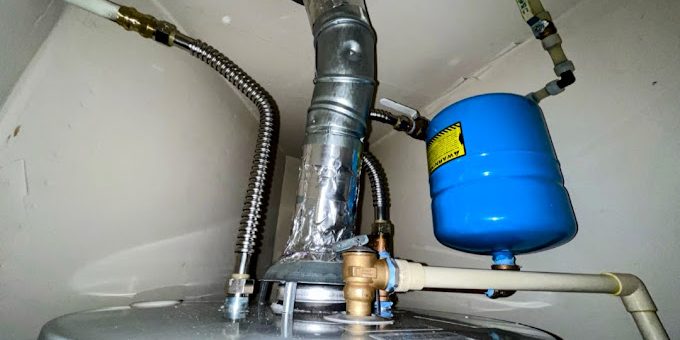McKinney, TX homeowners know that having a reliable water heater is essential for comfort and convenience. Whether you are replacing an old unit or installing a new one, the decision between a gas water heater and an electric water heater can be challenging. At Sewell Plumbing, we understand the importance of choosing the right water heater that meets your household’s needs. In this comprehensive guide, we’ll walk you through the key differences between gas and electric water heaters, helping you make an informed decision that suits your home in McKinney, TX, and surrounding areas like Allen, TX, Plano, TX, and Frisco, TX.
Key Takeaway:
Choosing between a gas water heater and an electric water heater depends on factors like energy efficiency, cost, installation requirements, and your household’s hot water usage.
Understanding Gas Water Heaters
How Gas Water Heaters Work
Gas water heaters use a burner at the base of the tank to heat the water. The burner is powered by natural gas or propane, and the hot water is stored in a hot water heater tank until needed. This system ensures a continuous supply of heated water, making it ideal for homes with high water usage.
Advantages of Gas Water Heaters
Gas water heaters offer several benefits:
- Faster heating times: Gas models heat water quicker than electric ones, making them ideal for large households in Richardson, TX and beyond.
- Lower operational costs: In areas where natural gas is cheaper than electricity, homeowners can save money in the long run.
- Works during power outages: Unlike electric models, gas water heaters can function even when there is a power outage, providing plumbing reliability.
Disadvantages of Gas Water Heaters
While gas water heaters have benefits, they also have drawbacks:
- Higher upfront costs: The initial installation of a gas water heater is often more expensive due to venting and gas line requirements.
- Maintenance and safety concerns: Regular leak detection is necessary to prevent gas leaks, ensuring the safety of your household.
- Space requirements: Gas heaters require proper ventilation, limiting where they can be installed.
Understanding Electric Water Heaters
How Electric Water Heaters Work
Electric water heaters use heating elements inside the tank to warm the water. They operate solely on electricity, making them a good choice for homes without natural gas connections.
Advantages of Electric Water Heaters
Electric water heaters come with several advantages:
- Lower installation costs: Since they don’t require a gas line or venting, installation is often cheaper.
- Energy-efficient options: Modern electric water heaters, including tankless water heater installation, provide excellent energy efficiency.
- Safety and convenience: With no risk of gas leaks, electric water heaters are considered safer for households.
Disadvantages of Electric Water Heaters
Despite their benefits, electric water heaters have some limitations:
- Slower heating times: Compared to gas models, electric water heaters take longer to heat water.
- Higher operational costs: Depending on electricity rates in Prosper, TX, running an electric water heater can be more expensive.
- No hot water during power outages: Since they rely on electricity, these heaters won’t function if there’s an outage.
Factors to Consider When Choosing a Water Heater
Energy Efficiency
Both gas and electric water heaters come in high-efficiency models, but electric models typically have a higher energy factor (EF) rating. If you’re considering an energy-efficient solution, tankless water heaters might be a great option.
Household Hot Water Needs
A large household in Celina, TX may benefit more from a gas model due to its fast recovery rate, while a smaller household in Melissa, TX might find an electric unit sufficient.
Installation Costs
Gas heaters require venting and gas line connections, making water heater installation more expensive. Electric models have a simpler installation process, reducing plumbing repair costs.
Environmental Impact
Electric water heaters can be powered by renewable energy sources, reducing their carbon footprint. Gas heaters, while efficient, emit carbon dioxide.
Answering Common Questions
What is the lifespan of a water heater? A gas water heater typically lasts 8-12 years, while an electric water heater can last 10-15 years with proper maintenance.
Which type of water heater is best for McKinney, TX homes? It depends on your home’s setup and needs. If your home has a gas line and high water usage, a gas model may be best. If you prefer lower installation costs and safety, an electric model is a great choice.
Can I switch from a gas water heater to an electric one? Yes, but it requires electrical upgrades, and vice versa, switching to gas may require venting modifications and a gas line installation.
Ensuring a Professional Installation
Choosing between a gas water heater and an electric water heater is a big decision. At Sewell Plumbing, we specialize in water heater replacement, water heater installation, and water heater repair across McKinney, TX, Anna, TX, and surrounding areas. Our expert plumbers ensure a seamless installation process tailored to your home’s needs.
For homeowners planning a full kitchen renovation or bathroom renovation, upgrading your water heater is an essential part of a functional, modern home. Whether you need drain cleaning services, leak detection, or septic service, our team is here to help.
If you’re unsure which hot water heater is right for you, contact Sewell Plumbing today for expert guidance. Visit our kitchen renovations page for more information on plumbing upgrades during home improvements.
Conclusion
No matter which type of water heater you choose, ensuring professional installation and maintenance is key to long-term efficiency. Whether you need a plumber in McKinney, TX, Frisco, TX, or Plano, TX, Sewell Plumbing is here to provide expert solutions for all your residential plumbing and commercial plumbing needs. Contact us today for reliable, efficient, and high-quality plumbing services near you!







